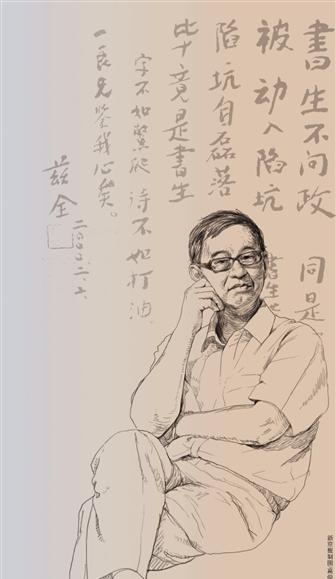
Beijing News Photo/Gao Junfu
See topic b02-b04 for details
In early 2017, scholar Ge Zhaoguang published two new books. The academic work "The Inside and Outside of Historical China" continues his attention to "China" in his previous works such as "Zhaozi China" and "What is "China"" and other previous works, and the academic history essay "Yu Yin" has turned his contemplation of China's religious, ideological and cultural history for more than twenty years into more than a dozen articles that are more intimate and readable to the public, and a generation of intellectuals who have suffered the tearing of their hearts in the great waves of the late Qing Republic of China have emerged on paper.
Previously, Ge Zhaoguang also published a collection of essays such as "Not Far Away History". At that time, he was "still quite confident" in the academic community, believing that the previous generation of scholars was still in the shadows, and if he "sent out the ghost of latent virtue", the younger generations could still follow the aftermath and follow the flow upwards. However, when the still visible afterglow gradually became a lingering aftersound, Ge Zhaoguang wrote in the preface to "Aftersound", "My state of mind is very desolate."
It has been nearly a hundred years since Chen Yinke, Wang Guowei, Wu Mi and others have been in the "unprecedented changes in thousands of years". Regarding contemporary times, Ge Zhaoguang once said at Peking University: Now is an era of obscurity, and we do not know what will happen to humanities scholarship in the future. We can write about the spirit, thoughts, emotions, and scholarship of the great scholars of the past, but we cannot be sure whether this aftersound will slowly disappear and become a masterpiece.
Such an insoluble solution is a kind of wandering that is difficult to face and cannot be completely resolved for every contemporary scholar who is also in the era of new and old transformation. For Ge Zhaoguang, a group of humanists who entered the school circles after the catastrophe of the "Cultural Revolution" and witnessed the impact of the market economy on the academic community for more than thirty years, there is a sense of "Lingtai has no way to escape the gods". In the several eras of China in the 20th century, the mutual stimulation of scholarship and imagination, the entanglement of knowledge and politics, and the relative struggle between reason and emotion, the fate and situation of intellectuals are very special. By the beginning of the 21st century, in an environment full of politicization and pragmatism, the slogan "North China is too big to put down a calm desk" has further become the reality of "China is big, there is no calm desk".
This topic is too heavy, you see, in this era, many people think that the enthusiasm of reading the Bible and reading poetry can make Chinese return to the humanistic tradition. But what Ge Zhaoguang has constantly emphasized in recent years is the most basic and urgent issue of how to rebuild the humanities. Reading "Yu Yin" and trying to understand his so-called humanistic tradition should be when everyone is accustomed to bending over, we should ask what will happen when standing up; in the era of the loss of the literati spirit and the decline of the humanities, humanistic scholars still have the spirit of realistic care and criticism, and put forward meaningful topics in the public field; in an era of turbulent transformation, in various ideological trends, in the sigh of "my way alone", a generation of scholars are still willing to find the "Tao".
Ge Zhaoguang on this bone fish in the throat. As a historian, he reflected that historical research cannot leave the public domain on its own and become a self-congratulatory "dragon slaying skill". Writing "Aftersound" in essays is not only a kind of commemoration, he also hopes to "ask the reader to listen to me patiently.". When a contemporary intellectual honestly exudes his inner desolation, are you willing to face his questions about the afterglow or the silence?